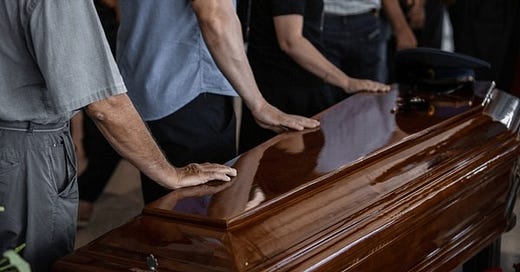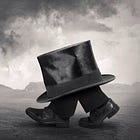How To Bring a Loved One Back From the Dead
Let me tell you about a secret power you may not know you have.
When the person you love most dies, it doesn’t hurt. Pain suggests sensation; that you can feel. In reality, you just go numb.
I had two years to prepare for my father’s death.
The clock began ticking with a phone call to my homeroom class during senior year.
My teacher picked up the receiver, listened intently, then hung up.
“You need to go to the front office,” he said.
At the office, someone handed me a phone. My mother’s voice came through, measured and WASPy—a tone that always makes me cringe when I hear it in myself.
It’s a fact-based tone, which attempts to convey the message, “Yes, we have a situation, but let’s take things step by step and not get ahead of ourselves.”
She explained that during a presentation at work, my father had frozen on a word. He couldn’t get it out, later describing it as “stuck in my throat.’
Then he had a seizure.
But not just any seizure.
We’re talking about the king of seizures.
The Alpha dog of seizures.
The seizure, that when you’re comparing seizures with friends and family who are talking shit about people they know who had seizures, makes them shut the fuck up.
The seizure that the nerds call tonic-clonic, but the homies call a grand mal seizure.
In any case, it was bad, and he was rushed to the ER, where he was given a CAT scan, which found that the source of the problem was that one of those annoying, cancerous tumors, had decided to call his brain home.
I don’t remember anything after that.
The next two years were filled with sorrow, pain, and, surprisingly, joy.
But still, nothing in those twenty-four months prepared me for the day when we lowered his casket into the ground.
In the thirty-five years since, I’ve thought about my father often.
I loved him before I discovered craft beer, hot sex, and the Ember Mug. At the time of his death I loved him more than anything else in my life—and only with the birth of my children have I loved something more.
(I know the following sentence violates the cardinal rule of every “Top 10 Tips for Writers” listicle ever written— show, don’t tell—but allow me to offer the authors of those articles a bag or two of dicks to eat, because, sometimes, the best way to say something is to just say it).
Put simply, he was the greatest person I’d ever known.
He was like me, but without the asshole part, possessing all my good traits and none of my flaws.
Eventually, I accepted the fact that he wouldn’t be there for the important and special events in my life. Yet the only thing I couldn’t come to terms with was that he would never get to meet my children—or they him.
Then, a few years after my daughter was born, something amazing happened.
Something I never would have expected.
Something I never would have believed.
I had a dream.
I was once at a party and noticed a large group of people surrounding a lady who was clearly holding court.
As I listened to the conversation, I realized that she was doing dream interpretation.
Enthusiastic and hopeful believers were peppering her with all sorts of questions, trying to discover the hidden meaning in their dreams.
Questions about unicorns, and rainbows, and swimming with telepathic dolphins flowed like water from the excited crowd.
I walked right into the middle of the circle and said to her with a straight face, “Last night, I had a dream I was in a pit of naked men, covered in honey. What do you think that means?”
Suffice it to say, that’s generally how I feel about dream interpretation.
But this dream was different.
It was a powerful dream.
A dream where you not only see, hear, and smell the people, but you feel them.
In this dream, I was at home with my wife, and my daughter was playing in the yard.
With her grandfather.
My father.
There he was, albeit somewhat older, doing his patented “I’ve got your nose” gag, and making her squeal with laughter.
I watched from inside the house as my wife went about making dinner.
Oddly enough, this scene didn’t strike me as unusual; that my father was alive, well, and playing with his four-year-old granddaughter.
Quite the contrary, I just felt a sense of calm, of peace, and of all things being right with the world.
Then, in a split second, everything changed.
Suddenly, my daughter turned and ran into the street.
I felt raw fear, terror, wash over me.
I saw cars at the end of the street coming her way.
I saw the joy of my life ending.
I saw my reason for living gone.
Almost instantly, my father ran after her.
I bolted out of the house as well, but he had a head start and was closer.
Chasing her down the street, my dad ran as fast as he could, but couldn’t catch up.
I pushed my legs furiously, watching the cars closing in on her, and I knew time was running out.
As I passed up my father, I came within a few feet of her.
Then, just as I thought everything was lost, I made a desperate lunge—stretching my body as far as it could go—and scooped her up into my arms.
To safety.
Upon waking, the quiet and stillness of the room clashed with my nocturnal tempest, leaving me momentarily unmoored, lost in the transition between dreamscape and morning light.
Slowly, I began the process of coming back to reality—the part where you remind yourself that “it was only a dream.”
Then something inside made me pause.
There is an Orwellian concept known as “doublethink,” in which the practitioner not only chooses to believe something untrue is true, but makes the choice to forget doing so, effectively reinventing their reality.
It’s a mental poison, a concept that corrodes critical thinking, so vile, so repugnant, that I can’t stomach anyone who embraces or defends it.
And because the emotions I experienced in this dream were as real and valid as any I’d ever felt, I fully embraced doublethink, hook, line, and fucking sinker, choosing, yes, choosing to believe that my father had met my daughter.
From the moment of birth, the hierarchy between a father and his son begins to invert.
On this journey from cared-for to caretaker, the trajectory is crucial. If the roles cross too soon, you end up with an arrogant, entitled man. If it happens too late—or not at all—you’re left with an emotionally stunted man-child.
My father died at forty-seven. I was just twenty. And thus, our relationship was forever frozen in amber.
Until my daughter was born.
After this dream, I chose to believe that my father, chasing after my daughter, and I passing him up and bringing her to safety, was a metaphor.
That I had gone from being the admirer to the admired.
From the protected to the protector.
From the son to the father.
A dream that helped me understand that my children could “meet” my father every day, through me, from the parts of me that were from him.
A little more than three years later, my son was born.
And as I watched him play, and learn, and grow, I looked forward to the day my father would come and visit him as well.
Read more stories from The Anecdote.








I felt it all. I have had dreams like that about my mom. When my grandson was born I thought I don't know how to be a grandma, how did my mom do it when I had my daughter? I missed her in that moment so fiercely & realized she'd never meet her great grandchild. Except maybe in a dream.
Thank you for this piece ❤️
Tears. Tears, on the side of my face.
In about two weeks, my husband and I will commemorate the one year anniversary of my father-in-law's sudden passing. His memory has popped up in some fascinating and unexpected ways, and it has completely turned our world in a different direction. Thank you for reminding me that memory (and dreams) are powerful means of connection.